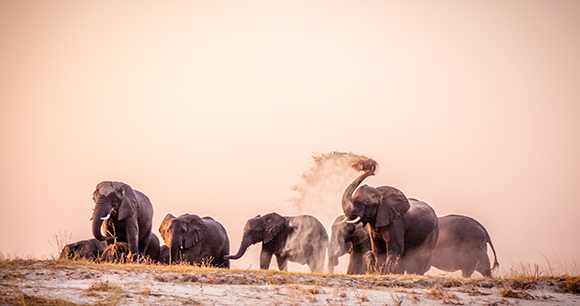
Panama City, Panama—As the world faces an unprecedented loss of biodiversity, the Animal Welfare Institute (AWI), joined by about 60 other animal protection and conservation organizations, helped secure significant progress for wildlife at the 19th meeting of the Conference of the Parties (CoP) to the Convention on International Trade in Endangered Species of Wild Fauna and Flora (CITES) in Panama City, Panama, last month. Over two weeks, governments from around the world, in consultation with the nongovernmental organizations in attendance, increased protections for hundreds of species threatened by the voracious global demand for pets, meat, ornaments, trophies, and timber. Among the meeting highlights:
Elephant, rhino exports blocked
The nations comprising the CITES Conference of the Parties agreed to a moratorium on most exports of live African elephants pending the outcome of a meeting of range states and other experts to discuss the topic. In addition, proposals by Zimbabwe to allow it to export elephant products and by Eswatini to allow it to export live rhinos and rhino products were defeated.
Limits on lizard and turtle trade for pets and meat
The parties approved a ban on the international commercial trade in the pygmy blue-tongue lizard (prized by collectors), the Leith’s softshell turtle, the red-crowned roof turtle, and the Indochinese box turtle. They also agreed for the first time to regulate the international commercial trade in the Jeypore ground gecko, the helmeted gecko, all horned lizards, the Chinese water dragon, two species of matamata turtles, the alligator snapping turtle and common snapping turtle, and five species of map turtles. The same protections were extended to two species of mud turtles, neotropical wood turtles, several softshell turtle species, and narrow-bridged, giant, and Mexican musk turtles.
Gains for amphibians
A proposal—rejected at the last CITES CoP—passed to prohibit exports of wild-caught specimens of 153 species of glass frogs that are in high demand from the pet trade. Parties also approved restrictions on the global pet trade for the Laos warty newt and Lemur leaf frog.
A major win for marine species targeted for luxury foods
The parties agreed to regulate trade in more than 50 species of requiem sharks threatened by the demand for shark fin soup, including blue, tiger, and bull sharks, as well as several species of hammerhead sharks and 37 species of guitarfish. Parties also supported regulating the trade in three species of sea cucumbers collected for delicacies.
Measures to weaken CITES protection mechanisms defeated
Parties rejected efforts by Botswana, Cambodia, Eswatini, and Namibia that would have made it more difficult for CITES to protect threatened species. The proposal sought to amend the listing criteria to include a requirement that, for a species to be listed, a determination must first be made that international trade is the key driver of its decline (not merely an important factor) and that food security, livelihoods, and socioeconomics must also factor into the listing decision—an attempt to stymie efforts to list species. Parties also rejected an undemocratic proposal that would have given more weight to votes cast by range states for species under debate. On elephant proposals, for example, Botswana wanted its vote to count more than a vote cast by the United States.
Help for the vaquita
Parties intensified pressure on Mexico to increase its efforts to combat illegal fishing of totoaba or face trade sanctions. The critically endangered vaquita porpoise becomes entangled in fishing nets used to catch totoaba, a fish coveted for its valuable swim bladder.
Protections for pangolins
The pangolin, the most highly trafficked mammal in the world, received added protections through amendments that aim to strengthen enforcement efforts, increase reporting requirements, improve monitoring and management of pangolin product stockpiles, and promote the closure of domestic pangolin markets contributing to the illegal international trade. In addition, the CITES Standing Committee can now issue recommendations that countries associated with the illegal pangolin trade be required to address threats to the species.
Pandemic prevention
The parties established a working group to consider the role of CITES in reducing the risk that international wildlife trade will trigger future public health emergencies.
Marjorie Fishman, Animal Welfare Institute
[email protected], (202) 446-2128
The Animal Welfare Institute (awionline.org) is a nonprofit charitable organization founded in 1951 and dedicated to reducing animal suffering caused by people. AWI engages policymakers, scientists, industry, and the public to achieve better treatment of animals everywhere—in the laboratory, on the farm, in commerce, at home, and in the wild. Follow us on Facebook, Twitter, and Instagram for updates and other important animal protection news.